Out of Print
Martika Escobar Resists Spectacle
by Sofia Guanzon
Photos courtesy of Martika Escobar
The award-winning director reflects on her breakout film Leonor Will Never Die more than a year since its premiere and how it and her career have gone through several incarnations.
In 1998, in the middle of Quirino Grandstand, the former action star pledged allegiance to the Filipino people, with a threat towards his enemies. “Huwag ninyo akong subukan,” Erap proclaimed, poised in his barong tagalog and perfectly coiffed hair.
It’s easy to see why we’re captivated by action stars who hone their star power towards political gain. They embody the air of an accidental hero who’s stumbled into public office where he works by day, while still fighting the goons of the small town’s corrupt mayor by night.
“It tells a lot of how Filipinos see themselves as people who need to be saved by a hero, baka may ganoong pag-transcend ng idea. And siguro, ako rin, as a person,” Martika Ramirez Escobar says from a pixelated Zoom call. “Films have made a great impact on my life. Like most of the things I know or I think I know, I’ve learned from watching movies.”
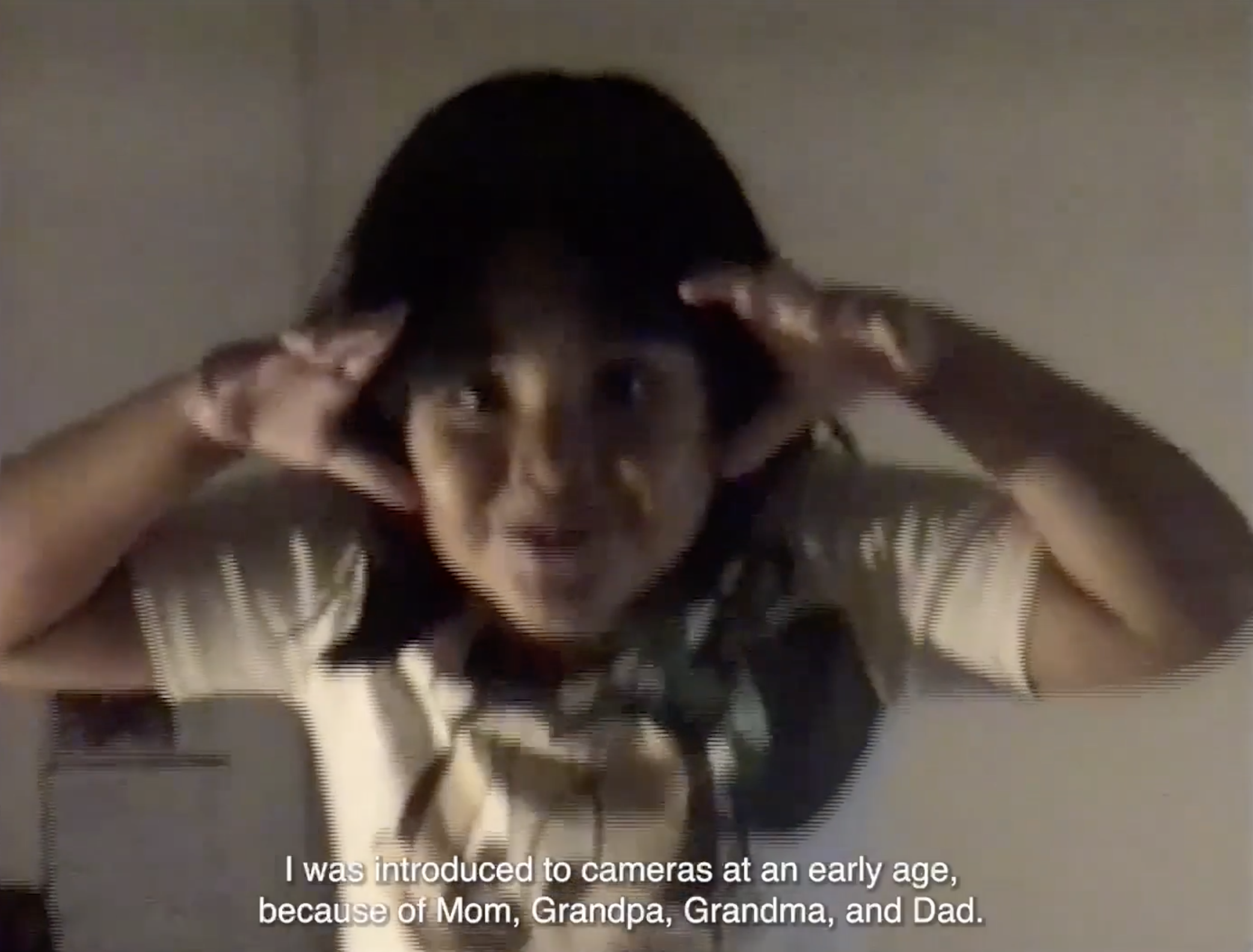
The Filipino action hero is an unassuming man of honor with a dark past. Or simply put, a good man willing to do bad things. He could be an ex-convict trying to make a better man of himself, or a military surgeon gone incognito (see: 2000’s Ang Dalubhasa starring Fernando Poe Jr.).
Their main conflict would be the loss of a close figure: a mother, a lover, or the lola. Their death would be at the hands of a high-ranking government official or a criminal syndicate leader. The happy ending is returning to the same hometown once ruled by a corrupt mayor, this time free of him and the culture of impunity that enabled him.
In this way, the action film is a microcosm of life in the Philippines from the vantage point of someone hardened by survival, living at the intersection of grief and politics.
Throughout Filipino action films, this narrative of alternative justice is foundational; a swift and effective performance. Cutting through the gaps of judicial bureaucracy, the hero of this film is not simply a character but the fulfillment of a kind of justice that seems mythical in the Philippines, where fairness is suggested as an afterthought.
It’s exactly what Martika subverts in her first feature film, Leonor Will Never Die (2022), which follows the titular character—a retired action film screenwriter and director—after she gets into a freak accident and wakes up in one of her unfinished screenplays, entitled “Ang Pagbabalik ng Kwago.”
Their main conflict would be the loss of a close figure: a mother, a lover, or the lola. Their death would be at the hands of a high-ranking government official or a criminal syndicate leader. The happy ending is returning to the same hometown once ruled by a corrupt mayor, this time free of him and the culture of impunity that enabled him.
In this way, the action film is a microcosm of life in the Philippines from the vantage point of someone hardened by survival, living at the intersection of grief and politics.
Throughout Filipino action films, this narrative of alternative justice is foundational; a swift and effective performance. Cutting through the gaps of judicial bureaucracy, the hero of this film is not simply a character but the fulfillment of a kind of justice that seems mythical in the Philippines, where fairness is suggested as an afterthought.
It’s exactly what Martika subverts in her first feature film, Leonor Will Never Die (2022), which follows the titular character—a retired action film screenwriter and director—after she gets into a freak accident and wakes up in one of her unfinished screenplays, entitled “Ang Pagbabalik ng Kwago.”
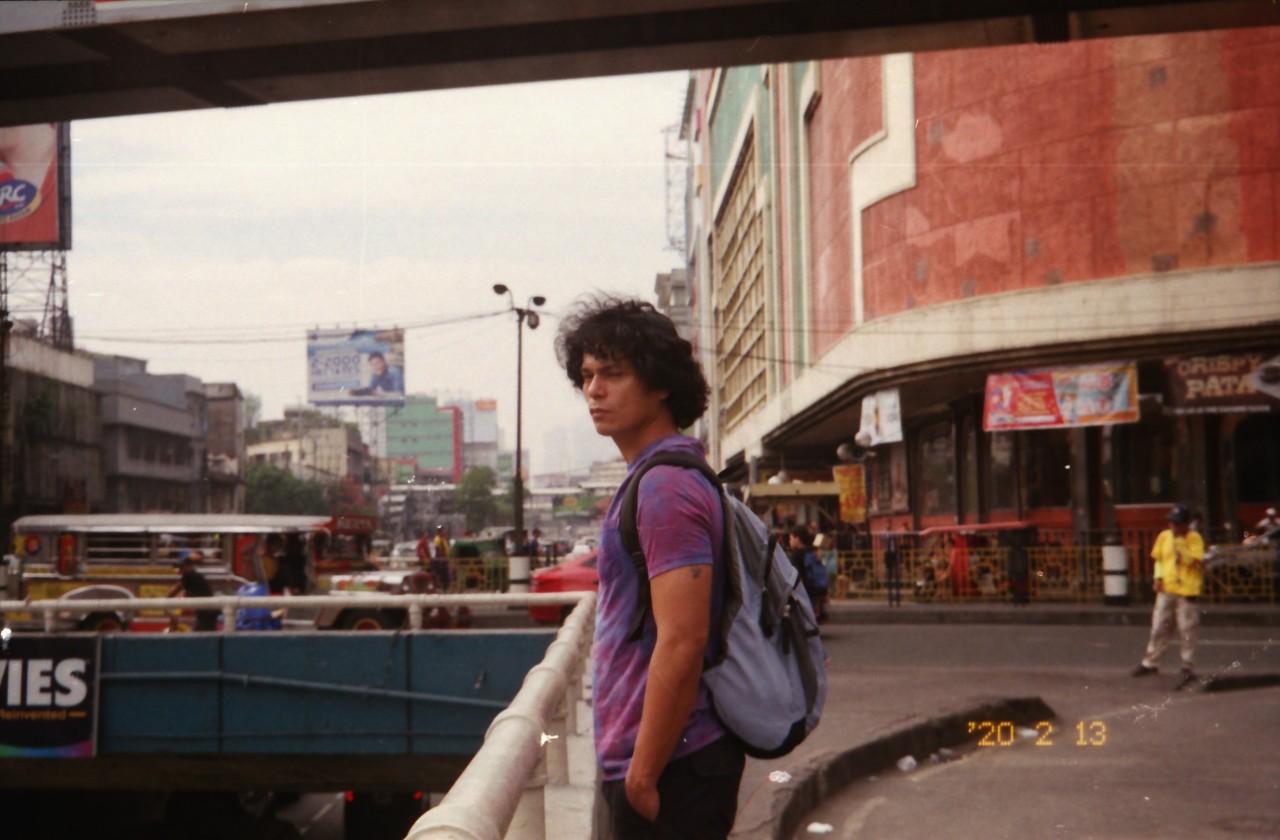
 Leonor Will Never Die behind-the-scenes
Leonor Will Never Die behind-the-scenesTo anyone who has ever loved a work of art or a craft so deeply, to be absorbed in its greatness is an insatiable pipe dream. Leonor Will Never Die is a dazzling, fully-realized exposition of this fantasy.
Lines of fiction and reality bleed into one another as the aging Leonor, played by the sensational Sheila Francisco, actively directs and writes her unproduced screenplay involving all the tropes, plot devices, and heightened theatricality that comprise the Filipino action film.
At the heart of Leonor is tenderness as a mode of rebellion. Amidst the kitschy gore and bullets flying, Leonor, the character, employs compassion as a balm to the violence and deeply rooted anxieties reflected in the film. While serving as part tribute and part critique, the film imagines sensitivity as a solution. Leonor as a heroine is just as bloodied, worn out, and in peril as the archetypal young, brusque hero of the genre, but will still hesitate killing a fully realized villain she wrote into her own screenplay.
Lines of fiction and reality bleed into one another as the aging Leonor, played by the sensational Sheila Francisco, actively directs and writes her unproduced screenplay involving all the tropes, plot devices, and heightened theatricality that comprise the Filipino action film.
At the heart of Leonor is tenderness as a mode of rebellion. Amidst the kitschy gore and bullets flying, Leonor, the character, employs compassion as a balm to the violence and deeply rooted anxieties reflected in the film. While serving as part tribute and part critique, the film imagines sensitivity as a solution. Leonor as a heroine is just as bloodied, worn out, and in peril as the archetypal young, brusque hero of the genre, but will still hesitate killing a fully realized villain she wrote into her own screenplay.
“Films have made a great impact on my life. Like most of the things I know or I think I know, I’ve learned from watching movies.”
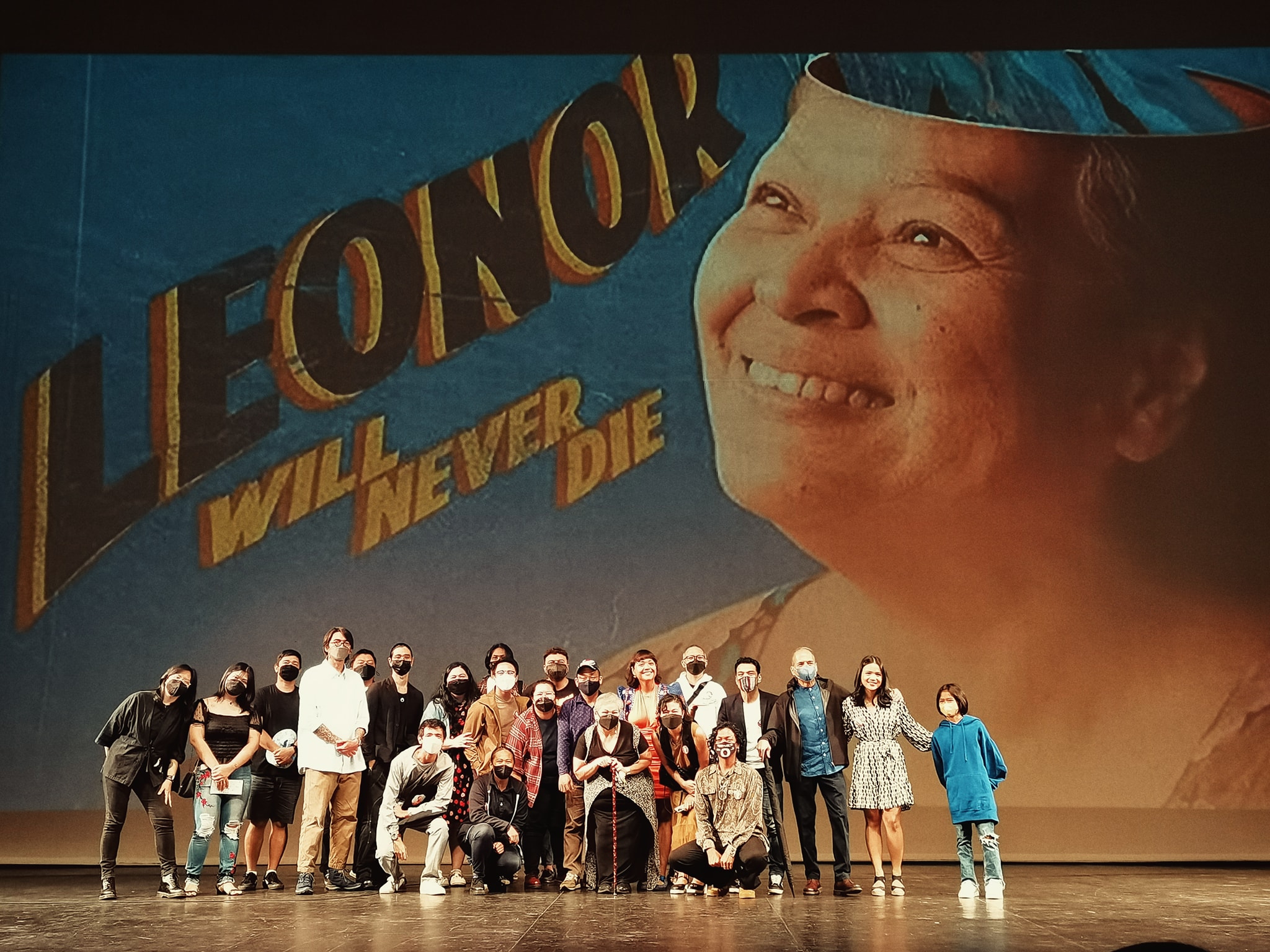
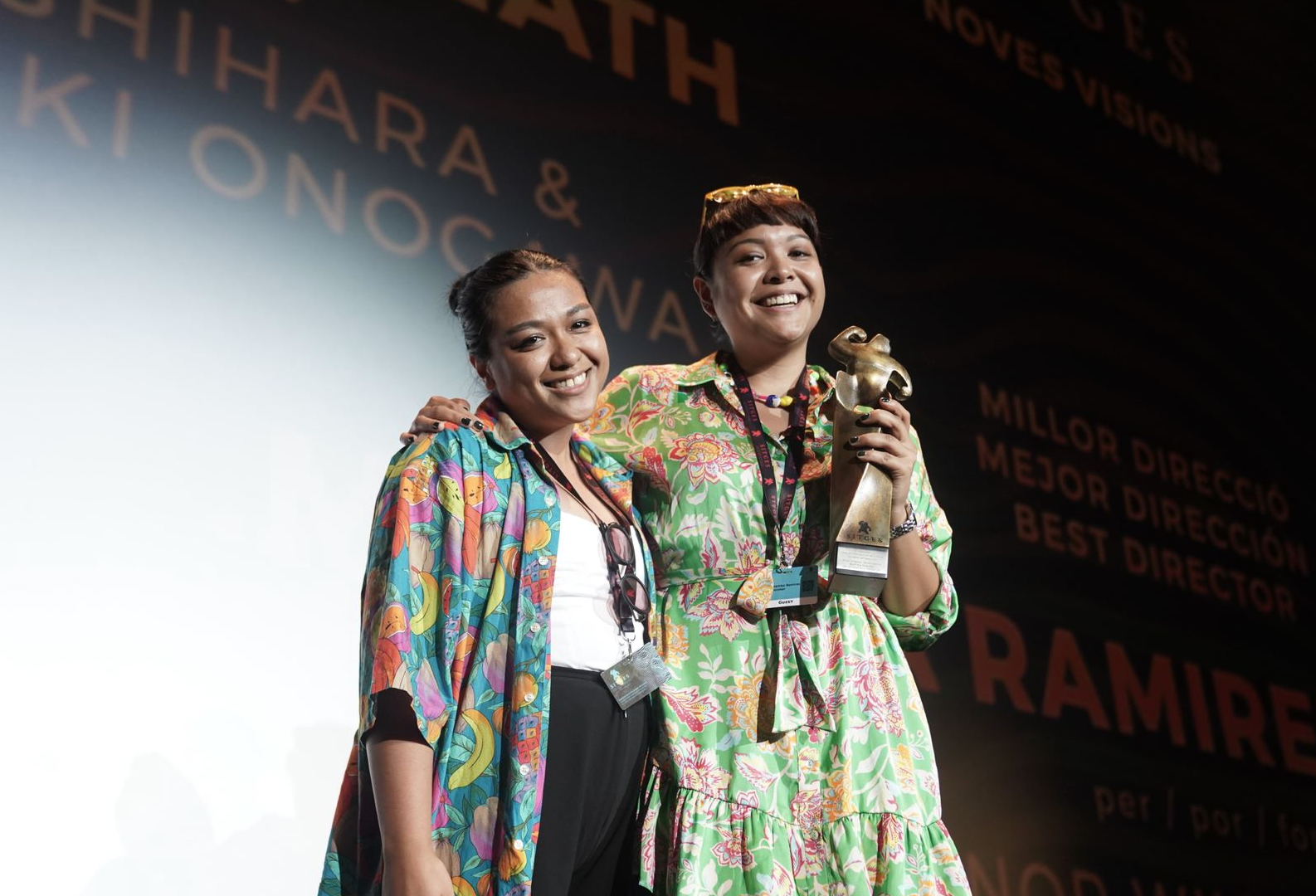
Leonor Will Never Die afterbirth
“It’s now taken on a life of its own and I feel like I’ve only recently ‘let go’ of it,” Martika muses about the film, this time over a Starbucks iced mocha along E. Rodriguez.
Leonor Will Never Die premiered at the World Cinema Dramatic Competition of the 2022 Sundance Film Festival, where Martika was awarded the Special Jury Prize for Innovative Spirit, and made history as the first Filipino film director to take home an award at the prestigious festival.
Highly specific to the universe of the middle class Filipino and particular to the themes of filial piety, grief, and desire—around which Philippine life, and thus cinema, revolves—the film is a supernova that has seized global independent cinema since its debut.
Since the film’s success at Sundance, Leonor Will Never Die has gone on to bag a number of accolades at many other festivals: the San Francisco International Asian American Film Festival, Los Angeles Asian Pacific Film Festival, Razor Reel Fantastic Film Festival, and the Toronto International Film Festival. Most recently, it was nominated for Best International Film at the 2023 Independent Spirit Awards.
Over a year since its debut, and after having the film live thousands of lives through the lens of viewers, critics, and the curious alike, she says she’s now allowed the film to organically take its course, adding that it’s just as surprising to see what viewers make of the film, and how it’s described internationally.
Leonor Will Never Die premiered at the World Cinema Dramatic Competition of the 2022 Sundance Film Festival, where Martika was awarded the Special Jury Prize for Innovative Spirit, and made history as the first Filipino film director to take home an award at the prestigious festival.
Highly specific to the universe of the middle class Filipino and particular to the themes of filial piety, grief, and desire—around which Philippine life, and thus cinema, revolves—the film is a supernova that has seized global independent cinema since its debut.
Since the film’s success at Sundance, Leonor Will Never Die has gone on to bag a number of accolades at many other festivals: the San Francisco International Asian American Film Festival, Los Angeles Asian Pacific Film Festival, Razor Reel Fantastic Film Festival, and the Toronto International Film Festival. Most recently, it was nominated for Best International Film at the 2023 Independent Spirit Awards.
Over a year since its debut, and after having the film live thousands of lives through the lens of viewers, critics, and the curious alike, she says she’s now allowed the film to organically take its course, adding that it’s just as surprising to see what viewers make of the film, and how it’s described internationally.
Set against realist vignettes of life here—from electricity getting cut off and Meralco knocking on your gate (“‘Pag bagong palabas, alam. Pero pagbayad ng kuryente, hindi niya magawa!”), to the absurdity of late night news headlines (“Binata Nabuntis ng Kanyang Jowa”)—the film remains nebulous in its narrative choices, withholding explanation for any of the absurdity.
When I first interviewed Martika about Leonor Will Never Die, the film just had its Philippine premiere during the latter half of 2022—at a critical junction in the pandemic here, when restrictions were unspooling towards normalcy and the cinema was no longer considered a hub for virus cultivation during a global health crisis.
“A cinema is a place of mystery,” Martika declares. “Until now, I understand the gravity of what has happened, na okay, we premiered and we’re having a lot of screenings. But I still can’t really believe it because, when we were making the film, all we wanted was to make it and screen it in a proper cinema. And to have that is enough.”
I have to ask Martika the obvious. If her life were a movie, what would the opening scene be?
A beat.
A sequence comes to her mind.
“It would begin like this: me, as a fetus, opening my eyes inside my mother’s womb. Only seeing the amniotic fluid.” She’s just come from a general checkup with her family at St. Luke's Medical Center, she explains. Coming from the obstetrics and gynecology unit, her mind is naturally drawn to images of motherhood as of the moment.
“I’m inspired by whatever just happened to me. I’m not really good with this,” she says, vaguely gesturing to the air. “I’m not good with words. But I see images. They’re not pieced together as a film yet. From images, I start writing.”
And as a writer, Martika is succinct and intentional. Curiosity in lieu of an answer.
“When I watch a film, it feels like the spectrum of understanding a feeling or knowing a person or a place expands. It shows how powerful cinema can be,” Martika explains. “Kaya, itong Leonor, may pagka-love letter din siya. Like, thank you cinema.”
On paper, the film is often described as a genre-bending meta homage to Philippine cinema. But to Martika, it began like most of her projects—first and foremost an exploration into the question of: What if we never really die? What if we get a glorious reprise? What if we all dissolve into the ephemera of our unfulfilled ambition?
These are interrogations that might as well remain unanswered, as Martika herself explains that her inspirations are circumstantial.
![]()
Leonor Will Never Die behind-the-scenes
When I first interviewed Martika about Leonor Will Never Die, the film just had its Philippine premiere during the latter half of 2022—at a critical junction in the pandemic here, when restrictions were unspooling towards normalcy and the cinema was no longer considered a hub for virus cultivation during a global health crisis.
“A cinema is a place of mystery,” Martika declares. “Until now, I understand the gravity of what has happened, na okay, we premiered and we’re having a lot of screenings. But I still can’t really believe it because, when we were making the film, all we wanted was to make it and screen it in a proper cinema. And to have that is enough.”
I have to ask Martika the obvious. If her life were a movie, what would the opening scene be?
A beat.
A sequence comes to her mind.
“It would begin like this: me, as a fetus, opening my eyes inside my mother’s womb. Only seeing the amniotic fluid.” She’s just come from a general checkup with her family at St. Luke's Medical Center, she explains. Coming from the obstetrics and gynecology unit, her mind is naturally drawn to images of motherhood as of the moment.
“I’m inspired by whatever just happened to me. I’m not really good with this,” she says, vaguely gesturing to the air. “I’m not good with words. But I see images. They’re not pieced together as a film yet. From images, I start writing.”
And as a writer, Martika is succinct and intentional. Curiosity in lieu of an answer.
“When I watch a film, it feels like the spectrum of understanding a feeling or knowing a person or a place expands. It shows how powerful cinema can be,” Martika explains. “Kaya, itong Leonor, may pagka-love letter din siya. Like, thank you cinema.”
On paper, the film is often described as a genre-bending meta homage to Philippine cinema. But to Martika, it began like most of her projects—first and foremost an exploration into the question of: What if we never really die? What if we get a glorious reprise? What if we all dissolve into the ephemera of our unfulfilled ambition?
These are interrogations that might as well remain unanswered, as Martika herself explains that her inspirations are circumstantial.
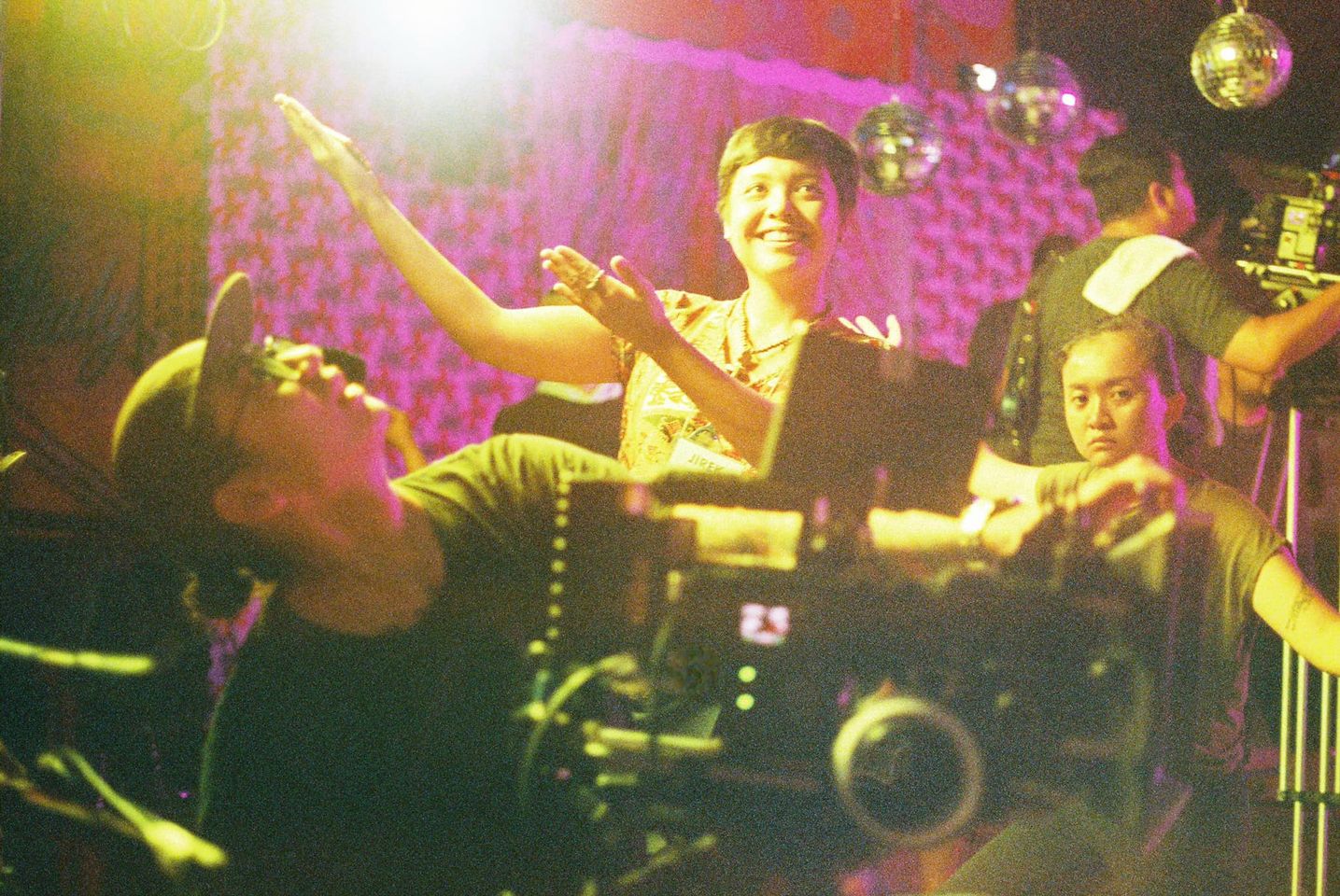
Leonor Will Never Die behind-the-scenes
“When I watch a film, it feels like the spectrum of understanding a feeling or knowing a person or a place expands. It shows how powerful cinema can be,” Martika explains. “Kaya, itong Leonor, may pagka-love letter din siya. Like, thank you cinema.”
“Napaisip lang ako why aren’t there any films about the action grandma?” she explains, “It started with a what if. As a person who’s interested in both old people and peculiar people, sabi ko, I think this is the film I would like to try to write.” Which is exactly how Leonor Will Never Die was born during a workshop with Mowelfund Film Institute, featuring actors dressed in goon-like attire (tucked-in polo shirts, sensible jeans, and heavy-duty boots), who looked like they had stepped right out of an action film.
“Of course, I’m happy that the response to Leonor was generally positive. If it went the other way, siguro magtatago ako ng mga ten years,” she jokes. “But what it really validated for me was that I’m still that silly kid who likes making movies.”
In the aftermath of her year of magical thinking, she’s gone on to join workshops like the prestigious Berlinale Talents 2023, where seeds for her next feature film have been nurtured.
“The function of filmmaking ay, para siyang friend. You feel understood, kapag nagawa mo siya at may nakaka-relate. Kahit isa lang ‘yun,” she says, noting how the process of writing an entirely new and more ambitious film this time around.
After settling into the ritual of being routinely asked about her career, her journey, the workshops she’s been a part of, and the festivals that have inducted the film into their inner sanctum, Martika admits the entire experience has been entirely weird (“Sobrang weird. Ilang beses ko nang sinabi, ang weird,” she says).
“What was the first moment in your life, na alam mo, ito na ‘yon?” I ask, thinking about how few of us have the gift of a craft that sings to us.
“Dalawang moment, actually,” Martika begins.
In her second year of high school, she made her directorial debut with a stop motion animation adaptation of Beowulf using LEGO and clay for her English class. She says, “Kahit ‘yung output was far from anything professional, I felt it was really that thing na gusto ko siyang gawin kahit mapuyat ka. Doon ko na-realize na this film thing can be fun, and at the same time people can appreciate it. Parang, umabot sa kanila ang saya.”
The second moment Martika realized she wanted to make a life out of filmmaking was as a graduating student taking up Film at the University of the Philippines Diliman, where she created films that interrogated the stuff of our daydreams.
In her thesis film Pusong Bato, which won Best Short Film at the 11th Cinemalaya Independent Film Festival in 2015, a faded movie star from the 1970s falls in love with a literal rock—examining the human fallibility of falling in love with ideas, concepts, intangibilities beyond our reach.
“Of course, I’m happy that the response to Leonor was generally positive. If it went the other way, siguro magtatago ako ng mga ten years,” she jokes. “But what it really validated for me was that I’m still that silly kid who likes making movies.”
In the aftermath of her year of magical thinking, she’s gone on to join workshops like the prestigious Berlinale Talents 2023, where seeds for her next feature film have been nurtured.
“The function of filmmaking ay, para siyang friend. You feel understood, kapag nagawa mo siya at may nakaka-relate. Kahit isa lang ‘yun,” she says, noting how the process of writing an entirely new and more ambitious film this time around.
After settling into the ritual of being routinely asked about her career, her journey, the workshops she’s been a part of, and the festivals that have inducted the film into their inner sanctum, Martika admits the entire experience has been entirely weird (“Sobrang weird. Ilang beses ko nang sinabi, ang weird,” she says).
“What was the first moment in your life, na alam mo, ito na ‘yon?” I ask, thinking about how few of us have the gift of a craft that sings to us.
“Dalawang moment, actually,” Martika begins.
In her second year of high school, she made her directorial debut with a stop motion animation adaptation of Beowulf using LEGO and clay for her English class. She says, “Kahit ‘yung output was far from anything professional, I felt it was really that thing na gusto ko siyang gawin kahit mapuyat ka. Doon ko na-realize na this film thing can be fun, and at the same time people can appreciate it. Parang, umabot sa kanila ang saya.”
The second moment Martika realized she wanted to make a life out of filmmaking was as a graduating student taking up Film at the University of the Philippines Diliman, where she created films that interrogated the stuff of our daydreams.
In her thesis film Pusong Bato, which won Best Short Film at the 11th Cinemalaya Independent Film Festival in 2015, a faded movie star from the 1970s falls in love with a literal rock—examining the human fallibility of falling in love with ideas, concepts, intangibilities beyond our reach.
Online, there’s a video of film student Martika explaining the short film with much rigor.
“Feeling ko for all the people who have seen it, open to many interpretations ito and ako personally, hindi ko gustong sabihin kung ano ang intention ko sa pelikula,” a younger Martika says, smiling in the video, as if she’s withholding the secret to her cinematic ethos. “Feeling ko ‘yung magic non, makukuha mo sa kung ano ang interpretation mo.”
This period after graduating college would also mark the creation story of what would eventually become Leonor Will Never Die, which she began writing at 21 years old and struggled to find funding for in the eight years it took for its completion.
“I started writing it in 2014. Kung tao ‘yun, Grade 2 na ‘yun,” the now 30-year-old Martika remarks. The film was shot in 2019, just before the COVID-19 pandemic, but was finished during its tumultuous peak.
She reveals that she eventually developed a love-hate relationship with writing the film, saying, “When I first wrote it, I was 21. Lalo na sa twenties, we change so quickly. The things we used to like, the next year, we hate them. So ‘yun na ‘yung nangyari sa akin with Leonor.”
“While writing Leonor, maraming moments na ‘call a friend.’ Like I’d ask friends to help me when I didn’t know what to do with the script. Si Sir Ricky Lee ‘yung isa doon, he was one of the first people who made me feel na, okay, I shouldn’t give up on this script just because I think I’m a bad writer. Kasi you can ask for help from people if you think your material isn’t good enough.”
Award-winning screenwriter, National Artist, mentor, and friend, Ricky Lee is one of the members of this film—or “friendship project,” as Martika generously calls it—to whom she says, she owes the project’s completion to. She remains unsparing of the praise for the team that was birthed with the film, notably her producers and fellow filmmakers Monster Jimenez and Mario Cornejo. “Sobrang weird na they’re always… available for me,” she remarks.
Availability, generosity, and trust are what Martika takes as the main drivers of success. Any attempt to commend her for her work is relegated to friends like Monster and Mario, who found the language for her idealism in meticulously composed sequences, in technicolor and vivid sound design and all the elements of an actualized film.
“Feeling ko for all the people who have seen it, open to many interpretations ito and ako personally, hindi ko gustong sabihin kung ano ang intention ko sa pelikula,” a younger Martika says, smiling in the video, as if she’s withholding the secret to her cinematic ethos. “Feeling ko ‘yung magic non, makukuha mo sa kung ano ang interpretation mo.”
This period after graduating college would also mark the creation story of what would eventually become Leonor Will Never Die, which she began writing at 21 years old and struggled to find funding for in the eight years it took for its completion.
“I started writing it in 2014. Kung tao ‘yun, Grade 2 na ‘yun,” the now 30-year-old Martika remarks. The film was shot in 2019, just before the COVID-19 pandemic, but was finished during its tumultuous peak.
She reveals that she eventually developed a love-hate relationship with writing the film, saying, “When I first wrote it, I was 21. Lalo na sa twenties, we change so quickly. The things we used to like, the next year, we hate them. So ‘yun na ‘yung nangyari sa akin with Leonor.”
“While writing Leonor, maraming moments na ‘call a friend.’ Like I’d ask friends to help me when I didn’t know what to do with the script. Si Sir Ricky Lee ‘yung isa doon, he was one of the first people who made me feel na, okay, I shouldn’t give up on this script just because I think I’m a bad writer. Kasi you can ask for help from people if you think your material isn’t good enough.”
Award-winning screenwriter, National Artist, mentor, and friend, Ricky Lee is one of the members of this film—or “friendship project,” as Martika generously calls it—to whom she says, she owes the project’s completion to. She remains unsparing of the praise for the team that was birthed with the film, notably her producers and fellow filmmakers Monster Jimenez and Mario Cornejo. “Sobrang weird na they’re always… available for me,” she remarks.
Availability, generosity, and trust are what Martika takes as the main drivers of success. Any attempt to commend her for her work is relegated to friends like Monster and Mario, who found the language for her idealism in meticulously composed sequences, in technicolor and vivid sound design and all the elements of an actualized film.
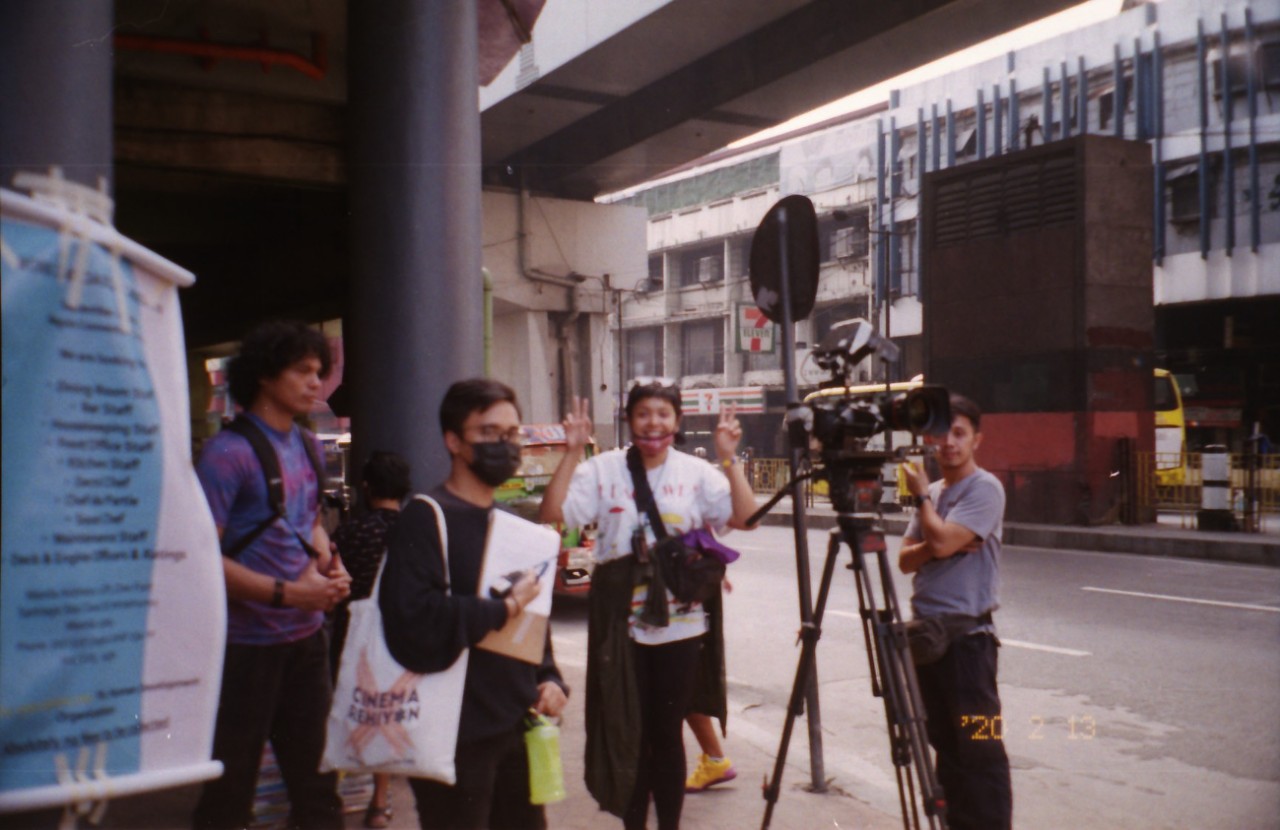 “The function of filmmaking ay, para siyang friend. You feel understood, kapag nagawa mo siya at may nakaka-relate. Kahit isa lang ‘yun,” she says, noting how the process of writing an entirely new and more ambitious film this time around.
“The function of filmmaking ay, para siyang friend. You feel understood, kapag nagawa mo siya at may nakaka-relate. Kahit isa lang ‘yun,” she says, noting how the process of writing an entirely new and more ambitious film this time around.

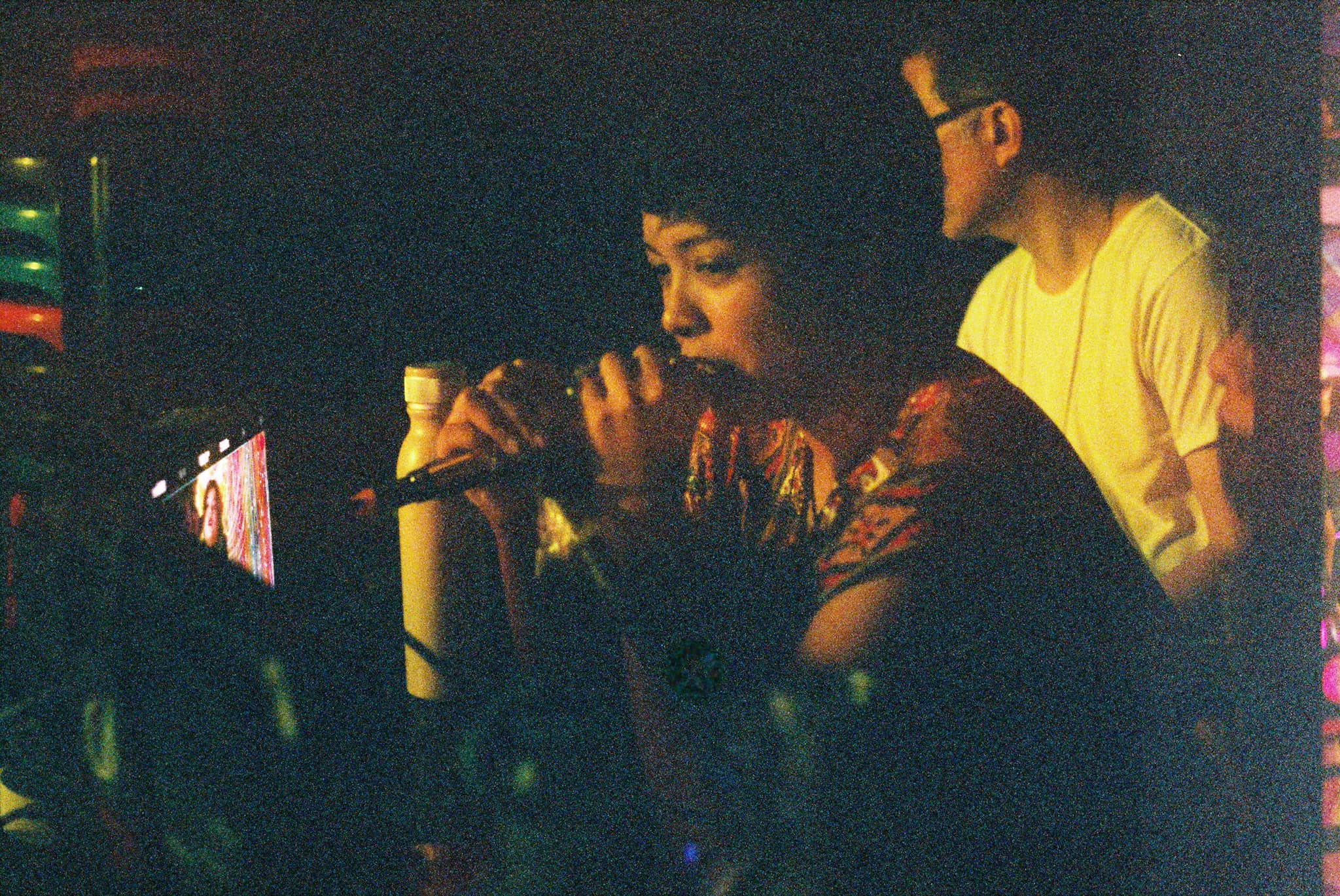
 Leonor Will Never Die behind-the-scenes
Leonor Will Never Die behind-the-scenes“Noong natapos na ‘yung film and we screened it, I felt na kahit walang may gusto nito, kahit walang manood, masaya ako sa process of making it with the people I love. As long as masaya kami at masaya ako sa kinalabasan, it’s a good enough reason to keep making films.”
Martika confesses that this indecisiveness and impulse to endlessly rewrite her own work has proven to be a major challenge as a filmmaker. Even during the weeks leading up to its premiere at Sundance, the film was perpetually changing, Martika adding, “I feel that I needed people to tell me na, ito na ‘yun. This is my film.”
If it were up to her alone, she admits that she might still be editing Leonor Will Never Die to this day. “It’s not the most polished. It has the spirit, I would say, of a student film. But it’s something I hope that we’re happy with.”
It’s work like this that reminds us that the idea that any of us can do anything on our own, much less anything great, is illusory. As the world withdraws from forced isolation reared by the pandemic, Martika’s boundless faith in community is a testament to the futility of individualism.
“This film taught me not my limits as a director but, more, trust. It’s about embracing the process of creating with silly people,” she answers with a self-assuredness that makes you want to believe in your own bizarreness as well.
“Noong natapos na ‘yung film and we screened it, I felt na kahit walang may gusto nito, kahit walang manood, masaya ako sa process of making it with the people I love. As long as masaya kami at masaya ako sa kinalabasan, it’s a good enough reason to keep making films.”
If it were up to her alone, she admits that she might still be editing Leonor Will Never Die to this day. “It’s not the most polished. It has the spirit, I would say, of a student film. But it’s something I hope that we’re happy with.”
It’s work like this that reminds us that the idea that any of us can do anything on our own, much less anything great, is illusory. As the world withdraws from forced isolation reared by the pandemic, Martika’s boundless faith in community is a testament to the futility of individualism.
“This film taught me not my limits as a director but, more, trust. It’s about embracing the process of creating with silly people,” she answers with a self-assuredness that makes you want to believe in your own bizarreness as well.
“Noong natapos na ‘yung film and we screened it, I felt na kahit walang may gusto nito, kahit walang manood, masaya ako sa process of making it with the people I love. As long as masaya kami at masaya ako sa kinalabasan, it’s a good enough reason to keep making films.”
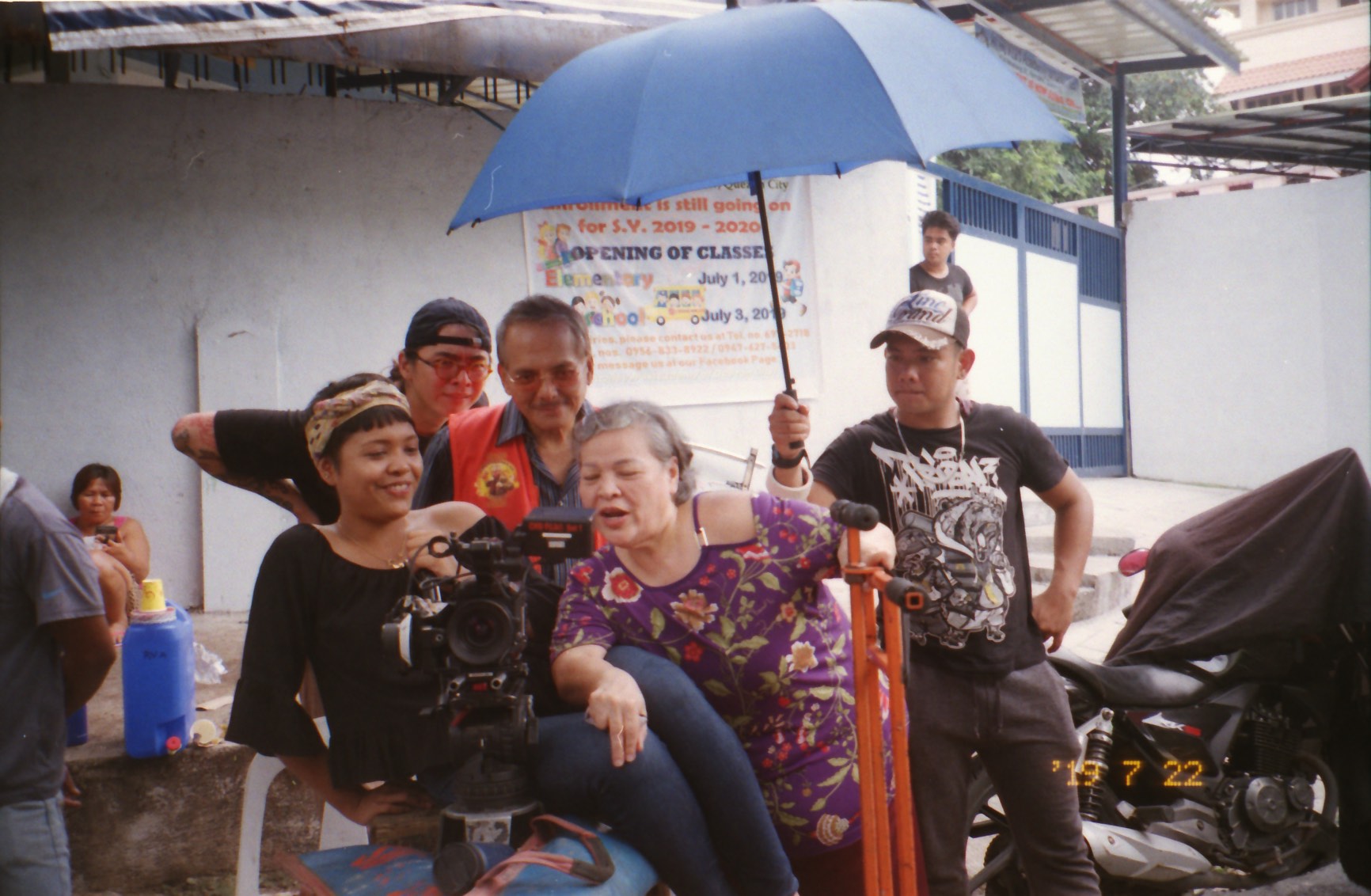

Leonor Will Never Die behind-the-scenes
The first time I met Martika, she introduced herself as a camera operator, cinematographer, and a bad writer. She had just returned home from the UP Film Institute minutes before our Zoom call, where she conducted a three-day smartphone cinematography workshop. In her words, what she really taught was do-it-yourself cinema, where her students were challenged with composing a two-shot of people talking using different shot sizes and shot angles.
While she doesn’t see herself as foremost a teacher or lecturer, she radiates a kind of generosity with her craft that is unyielding. She’s disarmingly nonchalant about the prestige of her track record as a filmmaker. She lends praise towards the larger communities that sustained her: her family, the country, Agnès Varda, etc.
“At this point, what do you want to be when you grow up?” I ask her.
“When I grow up, I want to be ethically rich, so I can make whatever film I want,” she says without a beat.
“I want to be like Sir Ricky, Monster, Mario…” she trails off. She wants to be available, generous, always making space for what’s possible. “I’d also like to teach younger children the arts, or about filmmaking, especially in more rural areas. If it can help at least one silly little kid who likes making films, then I’m happy.”
There’s an airy joy and silliness at the golden, sinewy center of Martika’s worldview. As a writer and director, Martika’s belief in joy is a spectacle in itself, something worth being revered and created.
In previous years, the Filipino films that have gained international recognition have been heavier thematically, making the triumph of having this female-led magical surrealist project feel like an overdue footnote in history. Without navel-gazing at identity politics and the need for Filipino representation in the global arena, the praise Leonor has gathered feels decorative for what this particular moment really is: a celebration.
While she doesn’t see herself as foremost a teacher or lecturer, she radiates a kind of generosity with her craft that is unyielding. She’s disarmingly nonchalant about the prestige of her track record as a filmmaker. She lends praise towards the larger communities that sustained her: her family, the country, Agnès Varda, etc.
“At this point, what do you want to be when you grow up?” I ask her.
“When I grow up, I want to be ethically rich, so I can make whatever film I want,” she says without a beat.
“I want to be like Sir Ricky, Monster, Mario…” she trails off. She wants to be available, generous, always making space for what’s possible. “I’d also like to teach younger children the arts, or about filmmaking, especially in more rural areas. If it can help at least one silly little kid who likes making films, then I’m happy.”
There’s an airy joy and silliness at the golden, sinewy center of Martika’s worldview. As a writer and director, Martika’s belief in joy is a spectacle in itself, something worth being revered and created.
In previous years, the Filipino films that have gained international recognition have been heavier thematically, making the triumph of having this female-led magical surrealist project feel like an overdue footnote in history. Without navel-gazing at identity politics and the need for Filipino representation in the global arena, the praise Leonor has gathered feels decorative for what this particular moment really is: a celebration.
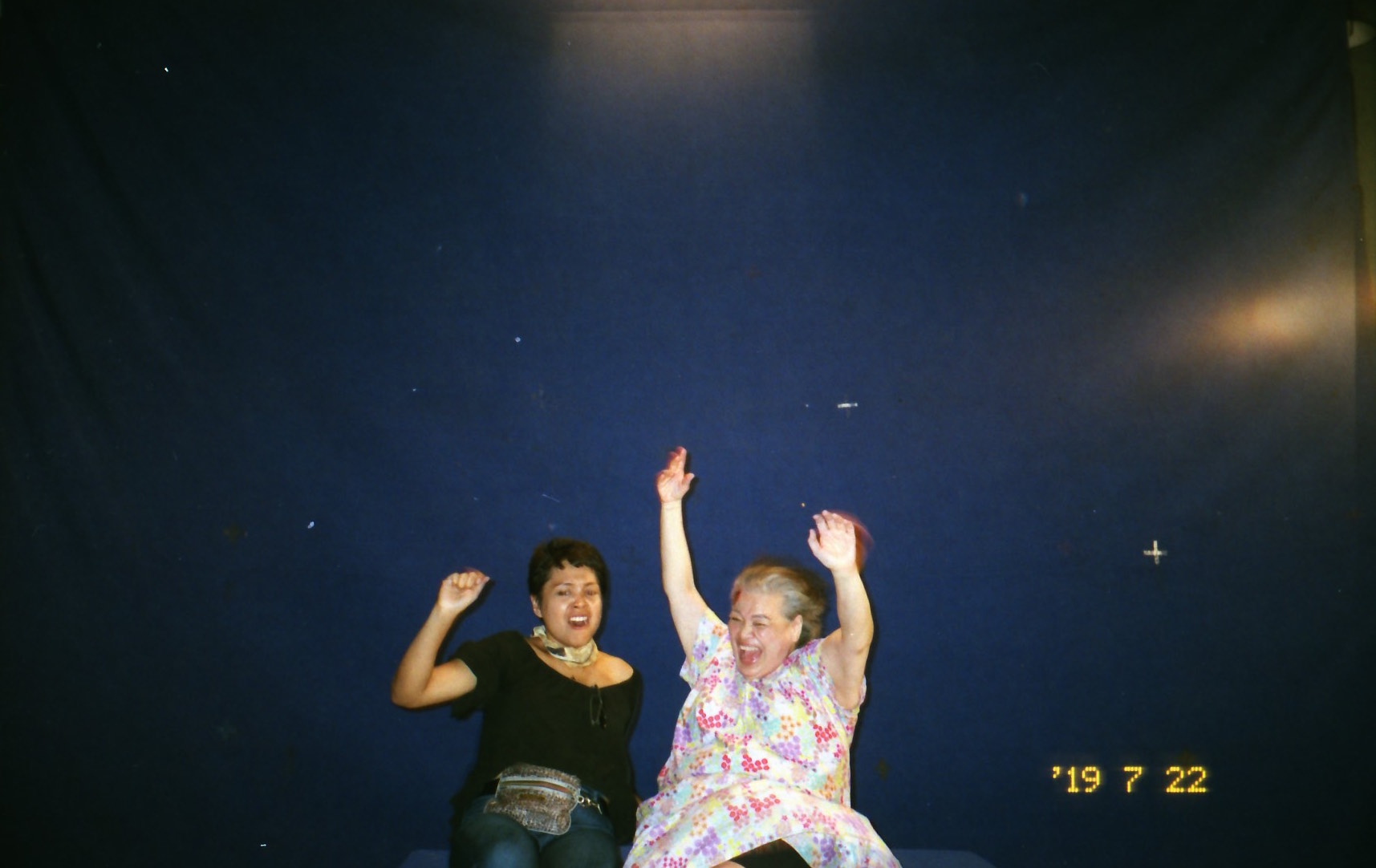

“As a filmmaker, gusto ko lang naman maging understood. Gusto ko lang makahanap ng people who also believe that the project is worth making,” she shares earnestly, adding, “‘Yung mga taong ‘yun, hard to find if you’re making a film that’s quite unconventional, not only sa narrative but also sa form.”
Understandably, a legion of young filmmakers like Martika herself has flooded her social media, declaring their admiration for her work and how Leonor Will Never Die is the latest addition into an aspiring director’s canon of works that prove that dreams can come true.
“Of course, I try to answer my best and give advice to anyone who asks pero minsan, parang, hindi ko rin alam kung ano ang sasabihin ko sa mga ibang filmmaker,” she says with a laugh. “Ipagpatuloy niyo lang.”
Martika, like many young filmmakers, is cognizant of the balance necessary to sustain a life in the arts—especially in Philippine cinema, where a handful of profitable studios and industry titans have cemented their place. “We had trouble finding the right funders or the right support because on paper and during the pitch, obvious na hindi siya kikita. It doesn’t have the elements of a box office hit,” she says candidly. “But once you find those people who will champion your project and your ideas, they’re priceless.”
All this to say, we are nothing if we do not hold each other.
“As a filmmaker, gusto ko lang naman maging understood. Gusto ko lang makahanap ng people who also believe that the project is worth making,” she shares earnestly, adding, “‘Yung mga taong ‘yun, hard to find if you’re making a film that’s quite unconventional, not only sa narrative but also sa form.”
“I try not to think of filmmaking as a career. That’s a very conscious choice. I just love making films,” she says. “I realized after making many short films, creating them is that one thing na gusto ko talagang gawin kahit mahirap, magastos, nakakaubos, pero at the same time nakakabuhay rin siya. Gets ba?”︎
“Of course, I try to answer my best and give advice to anyone who asks pero minsan, parang, hindi ko rin alam kung ano ang sasabihin ko sa mga ibang filmmaker,” she says with a laugh. “Ipagpatuloy niyo lang.”
Martika, like many young filmmakers, is cognizant of the balance necessary to sustain a life in the arts—especially in Philippine cinema, where a handful of profitable studios and industry titans have cemented their place. “We had trouble finding the right funders or the right support because on paper and during the pitch, obvious na hindi siya kikita. It doesn’t have the elements of a box office hit,” she says candidly. “But once you find those people who will champion your project and your ideas, they’re priceless.”
All this to say, we are nothing if we do not hold each other.
“As a filmmaker, gusto ko lang naman maging understood. Gusto ko lang makahanap ng people who also believe that the project is worth making,” she shares earnestly, adding, “‘Yung mga taong ‘yun, hard to find if you’re making a film that’s quite unconventional, not only sa narrative but also sa form.”
“I try not to think of filmmaking as a career. That’s a very conscious choice. I just love making films,” she says. “I realized after making many short films, creating them is that one thing na gusto ko talagang gawin kahit mahirap, magastos, nakakaubos, pero at the same time nakakabuhay rin siya. Gets ba?”︎
Sofia Guanzon is a writer based in Manila.